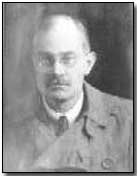Feature Articles - The Repression of War Experience by W. H. Rivers

Delivered before the Section
of Psychiatry, Royal Society of Medicine
on 4 December 1917 by
W. H. R. RIVERS, M.D. LOND., F.R.C.P. LOND.,
F.R.S.
(Late Medical Officer, Craiglockhart War Hospital)
Mr. President and Gentlemen:
I do not attempt to deal in this paper with the whole problem of the part taken by repression in the production and maintenance of the war neuroses.
Repression is so closely bound up with the pathology and treatment of these states that the full consideration of its role would amount to a complete study of neurosis in relation to the war.
The Process of Repression
It is necessary at the outset to consider an ambiguity in the term 'repression,' as it is now used by writers on the pathology of the mind and nervous system.
The term is currently used in two senses which should be carefully distinguished from one another. It is used for the process whereby a person endeavours to thrust out of his memory some part of his mental content, and it is also used for the state which ensues when, either through this process or by some other means, part of the mental content has become inaccessible to manifest consciousness.
In the second sense the word is used for a state which corresponds closely with that known as dissociation, but it is useful to distinguish mere inaccessibility to memory from the special kind of separation from the rest of the mental content which is denoted by the term "dissociation."
The state of inaccessibility may therefore be called suppression in distinction from the process of repression. In this paper I use repression for the active or voluntary process by which it is attempted to remove some part of the mental content out of the field of attention with the aim of making it inaccessible to memory and producing the state of suppression.
Using the word in this sense, repression is not in itself a pathological process, nor is it necessarily the cause of pathological states. On the contrary, it is a necessary element in education and in all social progress. It is not repression in itself which is harmful, but repression under conditions in which it fails to adapt the individual to his environment.
It is in times of special stress that these failures of adaptation are especially liable to occur, and it is not difficult to see why disorders due to this lack of adaptation should be so frequent at the present time. There are few, if any, aspects of life in which repression plays so prominent and so necessary a part as in the preparation for war.
The training of a soldier is designed to adapt him to act calmly and methodically in the presence of events naturally calculated to arouse disturbing emotions. His training should be such that the energy arising out of these emotions is partly damped by familiarity, partly diverted into other channels.
The most important feature of the present war in its relation to the production of neurosis is that the training in repression normally spread over years has had to be carried out in short spaces of time, while those thus incompletely trained have had to face strains such as have never previously been known in the history of mankind. Small wonder that the failures of adaptation should have been so numerous and so severe.
I do not now propose to consider this primary and fundamental problem of the part played by repression in the original production of the war neuroses. The process of repression does not cease when some shock or strain has removed the soldier from the scene of warfare, but it may take an active part in the maintenance of the neurosis.
New symptoms often arise in hospital or at home which are not the immediate and necessary consequence of the war experience, but are due to repression of painful memories and thoughts, or of unpleasant affective states arising out of reflection concerning this experience. It is with the repression of the hospital and of the home rather than with the repression of the trenches that I deal in this paper.
I propose to illustrate by a few sample cases some of the effects which may be produced by repression and the line of action by which these effects may be remedied.
I hope to show that many of the most trying and distressing symptoms from which the subjects of war neurosis suffer are not the necessary result of the strains and shocks to which they have been exposed in warfare, but are due to the attempt to banish from the mind distressing memories of warfare or painful affective states which have come into being as the result of their war experience.
Next - Attitude of Patients to War Memories
A "British warm" was a heavy issue greatcoat for officers.
- Did you know?
